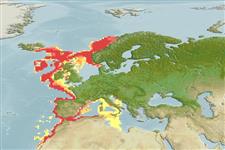Environment: milieu / climate zone / depth range / distribution range
Ekologi
laut; nir-ruaya; kisaran kedalaman 100 - 1000 m (Ref. 35388). Temperate; 69°N - 24°N, 18°W - 17°E
Northeast Atlantic: found in the western Mediterranean and in the Atlantic around the Strait of Gibraltar and to the south along the Moroccan coast.
Size / Weight / umur
Maturity: Lm ? range ? - ? cm
Max length : 16.1 cm TL jantan/; (Ref. 128593); common length : 10.0 cm TL jantan/; (Ref. 1371); Berat maksimum terpublikasi: 48.98 g (Ref. 128593); Umur maksimum dilaporkan: 3.00 Tahun (Ref. 1371)
Duri punggung (Keseluruhan (total)): 0; Duri dubur 0. Eyes large; mouth oblique; chin barbel absent. Color varies from pink to light brown dorsally, silvery on sides and ventrally (Ref. 1371). Scales large, silvery and easily detached. Lateral line ends in 7 open mucus grooves on the upper side of the head (Ref. 35388).
Occurs in large schools over mud, muddy sand, gravel and rock bottoms. Feeds on small crustaceans and maybe worms. Preyed upon by other valuable fish (Ref. 1371). Spawns in the winter in the western Mediterranean and in the spring farther north (Ref. 35388).
The major spawning grounds are located in the western part of the Mediterranean, on both sides of the Straits of Gibraltar, in deep water.
Cohen, D.M., T. Inada, T. Iwamoto and N. Scialabba, 1990. FAO species catalogue. Vol. 10. Gadiform fishes of the world (Order Gadiformes). An annotated and illustrated catalogue of cods, hakes, grenadiers and other gadiform fishes known to date. FAO Fish. Synop. 125(10). Rome: FAO. 442 p. (Ref. 1371)
Status IUCN Red List (Ref. 130435)
ancaman kepada manusia
Harmless
penggunaan manusia
Perikanan: nilai komersial kecil; umpan: usually
informasi lanjut
AcuanBudidaya airprofil budidaya airStrainGenetikaElectrophoresesDiturunkanPenyakit-penyakitPengolahanNutrientsMass conversion
Alat, peralatan
laporan khas
muat turun XML
Sumber internet
Estimates based on models
Preferred temperature (Ref.
123201): 3.4 - 13.9, mean 7.9 °C (based on 254 cells).
Phylogenetic diversity index (Ref.
82804): PD
50 = 0.7500 [Uniqueness, from 0.5 = low to 2.0 = high].
Bayesian length-weight: a=0.00676 (0.00567 - 0.00806), b=3.08 (3.03 - 3.13), in cm total length, based on LWR estimates for this species (Ref.
93245).
Trophic level (Ref.
69278): 3.6 ±0.3 se; based on diet studies.
Generation time: 5.8 ( na - na) years. Estimated as median ln(3)/K based on 2
growth studies.
Daya lenting (Ref.
120179): sedang, Waktu penggandaan populasi minimum 1.4 - 4.4 tahun (K=0.19-0.50; tmax=3.0).
Fishing Vulnerability (Ref.
59153): Low to moderate vulnerability (25 of 100).
Nutrients (Ref.
124155): Calcium = 61.8 [31.4, 132.3] mg/100g; Iron = 0.524 [0.258, 1.013] mg/100g; Protein = 17.8 [16.3, 19.3] %; Omega3 = 0.96 [0.45, 2.06] g/100g; Selenium = 12.2 [5.0, 31.6] μg/100g; VitaminA = 24.4 [5.5, 106.1] μg/100g; Zinc = 0.755 [0.473, 1.180] mg/100g (wet weight);
